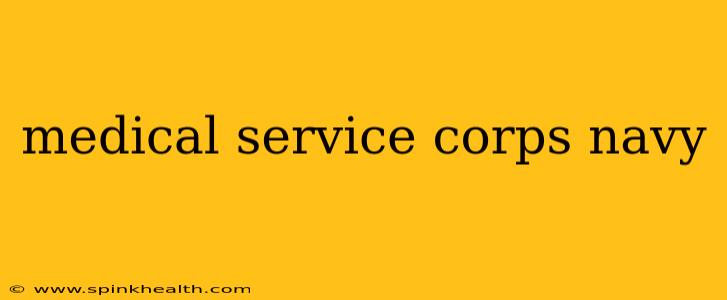The crisp salt air, the rhythmic crash of waves against the hull, the unwavering dedication to service – these are the hallmarks of a career in the Navy. But for those driven by a passion for healing and a commitment to national defense, the Navy Medical Service Corps (MSC) offers a unique and rewarding path. It’s more than just a job; it’s a calling to serve your country while making a profound difference in the lives of others.
My own journey into the MSC began with a simple desire to combine my love for medicine with my patriotic spirit. I'd always been fascinated by the complexities of the human body and the power of healing. Joining the Navy felt like the perfect blend of these passions, and the MSC provided the perfect avenue to pursue both. This post will explore the intricacies of this often-overlooked but critically important branch of the Navy, answering some frequently asked questions.
What Does a Navy Medical Service Corps Officer Do?
The roles within the MSC are incredibly diverse, reflecting the multifaceted needs of a global naval force. Forget the stereotypical image of a doctor in a sterile hospital room. MSC officers can find themselves deployed on aircraft carriers, stationed at shore facilities, or even working within specialized research and development units.
Think about it: you could be managing a hospital ward at a stateside base, providing essential healthcare to sailors and their families; or you could be part of a forward-deployed medical team, providing life-saving care in the midst of a humanitarian crisis or during a combat operation. The possibilities are as vast as the ocean itself. Specific roles often depend on your chosen specialty and your career progression within the Corps.
What are the Different Specialties in the Navy Medical Service Corps?
The MSC isn't limited to just physicians. It embraces a wide array of healthcare professionals, each contributing vital skills to the overall mission. These include:
- Registered Nurses: Providing direct patient care, often in high-pressure environments.
- Physician Assistants: Working closely with physicians, providing crucial medical support.
- Medical Service Corps Officers with advanced degrees: This could encompass specialists in areas like healthcare administration, health informatics, or public health, ensuring the smooth and efficient operation of the Navy's healthcare system.
- Other Allied Health Professionals: This broad category encompasses numerous other vital roles such as physical therapists, optometrists, dentists and more. Each brings a specialized skillset to benefit the health and wellness of the Navy community.
What are the Educational Requirements for the Navy Medical Service Corps?
The educational requirements vary depending on the specific specialty you pursue. Generally, a minimum of a bachelor's degree is required, but advanced degrees (master's or doctorate) are often preferred, especially for leadership positions or specialized roles. Specific licensing and certifications are also necessary for many positions within the MSC. It's best to directly consult the official Navy recruiting website for the most up-to-date and accurate information.
What is the Career Progression Like in the Navy Medical Service Corps?
The MSC offers a clear and defined career path with opportunities for advancement. Starting as a junior officer, you’ll gain experience and progressively take on more responsibility. With dedication and proven competence, you can climb the ranks to high-level leadership roles, shaping the future direction of Navy healthcare. This includes opportunities to lead medical departments, manage programs, and participate in the strategic planning of Navy medical services.
How Competitive is It to Join the Navy Medical Service Corps?
Competition for a spot in the MSC can be quite intense, particularly for coveted specialities. The Navy seeks highly qualified and motivated individuals, so a strong academic record, relevant experience, and demonstrable leadership skills are crucial to a successful application. Thorough preparation is essential.
What are the Benefits of Joining the Navy Medical Service Corps?
The benefits extend far beyond a paycheck. A career in the MSC offers:
- Competitive Salary and Benefits: Including comprehensive healthcare, retirement plans, and opportunities for professional development.
- Travel and Deployment Opportunities: Experiencing different cultures and environments while serving your country.
- Personal Growth and Development: Gaining valuable skills and leadership experiences that can benefit you throughout your life.
- Sense of Purpose and Fulfillment: Knowing you are contributing to the well-being of our nation's sailors and their families.
The Navy Medical Service Corps represents more than just a job; it's a voyage of service, purpose, and growth. If you're considering a career path that combines your passion for medicine with your dedication to country, the MSC may just be your true north.

